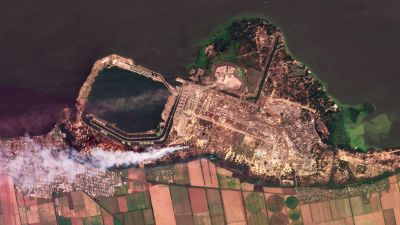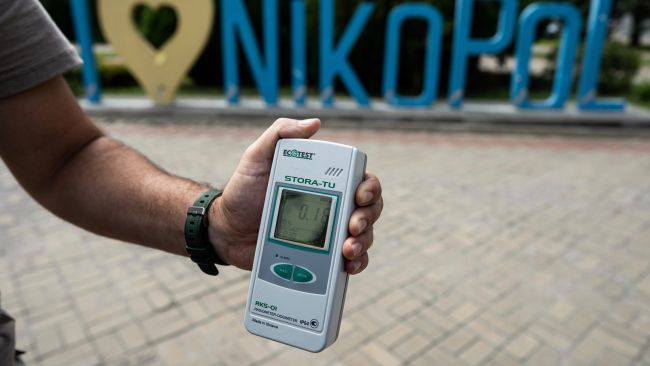Sunday 28 August 2022

This composite of satellite images shows smoke rising from fires at the Zaporizhzhia nuclear power plant
Credit: Planet Labs PBC/AP
Fears of a potential leak at Europe's largest nuclear power plant has prompted authorities to hand out anti-radiation sickness tablets, as both Russia and Ukraine.
Ukraine said Russian forces fired on areas just across the river from the plant, while Russia claimed Ukrainian shells hit a building where nuclear fuel is stored.
Russian rocket and artillery strikes had hit areas across the Dnieper River from Zaporizhzhia Nuclear Power Plant, Ukrainian officials said Sunday, as fears persisted that fighting in the vicinity could damage the plant and cause a radiation leak.
Authorities have been distributing iodine tablets to residents who live near the southeastern Ukraine plant over the past week in case of radiation exposure, which can cause health problems.
Much of the concern centres on the cooling systems for the plant's nuclear reactors.
The systems require power to run, and the plant was temporarily knocked offline Thursday because of what officials said was fire damage to a transmission line.
A cooling system failure could cause a nuclear meltdown.
Fears of a potential leak at Europe's largest nuclear power plant has prompted authorities to hand out anti-radiation sickness tablets, as both Russia and Ukraine.
Ukraine said Russian forces fired on areas just across the river from the plant, while Russia claimed Ukrainian shells hit a building where nuclear fuel is stored.
Russian rocket and artillery strikes had hit areas across the Dnieper River from Zaporizhzhia Nuclear Power Plant, Ukrainian officials said Sunday, as fears persisted that fighting in the vicinity could damage the plant and cause a radiation leak.
Authorities have been distributing iodine tablets to residents who live near the southeastern Ukraine plant over the past week in case of radiation exposure, which can cause health problems.
Much of the concern centres on the cooling systems for the plant's nuclear reactors.
The systems require power to run, and the plant was temporarily knocked offline Thursday because of what officials said was fire damage to a transmission line.
A cooling system failure could cause a nuclear meltdown.

A Geiger counter shows increased radiation level in Nikopol, Ukraine.
Credit: AP
Russian forces occupied the nuclear plant complex early in the six-month-old war, but local Ukrainian workers have kept it running.
The Ukrainian and Russian governments have repeatedly accused the other of shelling the complex and nearby areas, raising fears of a possible catastrophe.
Russian forces occupied the nuclear plant complex early in the six-month-old war, but local Ukrainian workers have kept it running.
The Ukrainian and Russian governments have repeatedly accused the other of shelling the complex and nearby areas, raising fears of a possible catastrophe.
Zaporizhzhia: Fire cuts off occupied Ukrainian nuclear plant from power grid
Heavy firing overnight into Sunday left parts of Nikopol without electricity, said Valentyn Reznichenko, governor of the Dnipropetrovsk region.
Rocket strikes damaged about a dozen residences in Marhanets, according to Yevhen Yevtushenko, the administration head for the district that includes the city of about 45,000.
The city of Zaporizhzhia, about 40 kilometers (25 miles) upriver from the nuclear plant, also came under fire during the night, wounding two people, city council member Anatoliy Kurtev said.
In eastern Ukraine, where Russian and separatist forces are trying to take control, shelling hit the large and strategically significant cities of Kramatorsk and Sloviansk, but no casualties were reported, said Pavlo Kyrylenko, governor of the Donetsk region.
Much of the Donetsk region is held by Russian and separatist forces. It is one of two Ukrainian regions that Russia has recognized as sovereign states.
Periodic shelling has damaged the power station's infrastructure, Ukraine’s nuclear power operator, Energoatom, said Saturday. "There are risks of hydrogen leakage and sputtering of radioactive substances, and the fire hazard is high,” it said.
The governor of Ukraine’s Dnipropetrovsk region, Valentyn Reznichenko, said Saturday that Russian Grad missiles and artillery shells hit the cities of Nikopol and Marhanets, each located 10 kilometres (6 miles) across the Dnieper River from the plant.
But Russian Defense Ministry spokesman Igor Konashenkov said Ukrainian forces had fired on the plant from Marhanets.
Over the past day, 17 Ukrainian shells hit the plant, with four striking the roof of a building that stores nuclear fuel, he said.
Associated Press reported it was not immediately possible to verify either account.
The United Nations' atomic energy agency has tried to work out an agreement to send a team in to inspect and help secure the plant. Officials said preparations for the visit were underway, but it remained unclear when it might take place.
Europe's biggest nuclear plant was disconnected from the national grid for the first time in its history because of fire damage. ITV News' Ian Woods reports.
Ukrainian President Volodymyr Zelenskyy said it was essential for International Atomic Energy Agency representatives to get to the plant as soon as possible and to help keep it "under permanent Ukrainian control.”
“The situation remains precarious and dangerous,” Mr Zelenskyy said Friday in his nightly address.
“Any repetition of (Thursday's) events, i.e., any disconnection of the station from the grid or any actions by Russia that could trigger the shut down of the reactors, will once again put the station one step away from disaster.”
The governor of Ukraine’s Dnipropetrovsk region, Valentyn Reznichenko, said Saturday that Russian Grad missiles and artillery shells hit the cities of Nikopol and Marhanets, each located 10 kilometres (6 miles) across the Dnieper River from the plant.
But Russian Defense Ministry spokesman Igor Konashenkov said Ukrainian forces had fired on the plant from Marhanets.
Over the past day, 17 Ukrainian shells hit the plant, with four striking the roof of a building that stores nuclear fuel, he said.
Associated Press reported it was not immediately possible to verify either account.
The United Nations' atomic energy agency has tried to work out an agreement to send a team in to inspect and help secure the plant. Officials said preparations for the visit were underway, but it remained unclear when it might take place.
Europe's biggest nuclear plant was disconnected from the national grid for the first time in its history because of fire damage. ITV News' Ian Woods reports.
Ukrainian President Volodymyr Zelenskyy said it was essential for International Atomic Energy Agency representatives to get to the plant as soon as possible and to help keep it "under permanent Ukrainian control.”
“The situation remains precarious and dangerous,” Mr Zelenskyy said Friday in his nightly address.
“Any repetition of (Thursday's) events, i.e., any disconnection of the station from the grid or any actions by Russia that could trigger the shut down of the reactors, will once again put the station one step away from disaster.”
Ukraine has claimed Russia is using the power plant as a shield by storing weapons there and launching attacks from around it.
Moscow, for its part, accuses Ukraine of firing on the nuclear complex.
The dispute over the plant led Russia late Friday to block agreement on the final document of the four-week-long review of the UN treaty that is considered the cornerstone of nuclear disarmament.

A crater from an overnight Russian rocket attack, near to damaged buildings in downtown Kharkiv, Ukraine, on Saturday.
Credit: Ap/Andrii Marienko
The draft document of the Nuclear Nonproliferation Treaty review conference criticised Russia's takeover of the Zaporizhzhia plant.
The deputy head of Russia's delegation said the conference became “a political hostage” to countries that were trying “to settle scores with Russia by raising issues that are not directly related to the treaty.”
The draft document of the Nuclear Nonproliferation Treaty review conference criticised Russia's takeover of the Zaporizhzhia plant.
The deputy head of Russia's delegation said the conference became “a political hostage” to countries that were trying “to settle scores with Russia by raising issues that are not directly related to the treaty.”
Requiem/Панахида for the Victims of Chornobyl
- Roman Hurko/Роман Гурко
Sep 3, 2014 Requiem/Panachyda for the Victims of Chornobyl (2001)
Composed by Roman Hurko
Photography by Robert Polidori
from: "Zones of Exclusion: Prypiat and Chernobyl"
Video Montage by Jacques Collin
Performed by the Frescoes of Kyiv Chamber Choir (Kyiv, Ukraine)
Oleksandr Bondarenko, conductor
Mykola Kholodyj, tenor soloist
Oleksandr Bondarenko, bass soloist
0:00 Holy God (Trisagion)
5:58 Our Father
9:51 With the just spirits
16:32 Litany
19:02 Dismissal
23:49 Everlasting memory
The Chornobyl nuclear disaster occurred on April 26th, 1986.
This piece was premiered by the Frescoes of Kyiv Chamber Choir in St. Michael's Golden Domed Ukrainian Orthodox Cathedral in Kyiv, Ukraine, on April 26th, 2001, to commemorate the 15th anniversary of the disaster. It was again performed on April 26th, 2006 in Toronto's Roy Thompson Hall, to commemorate the 20th anniversary of the disaster, this time together with the projected photography of Robert Polidori from his book "Zones of Exlusion:Prypiat and Chernobyl", as shown here in this video by videographer Jacques Collin.
No comments:
Post a Comment